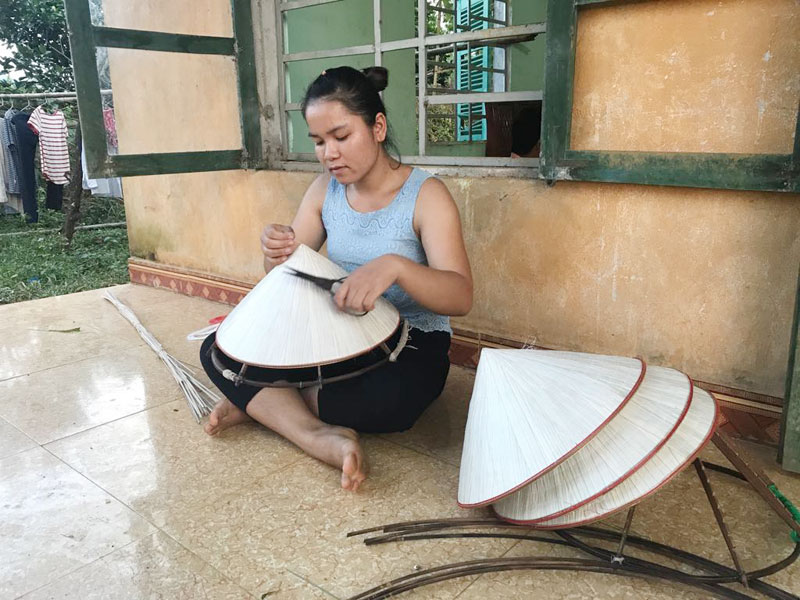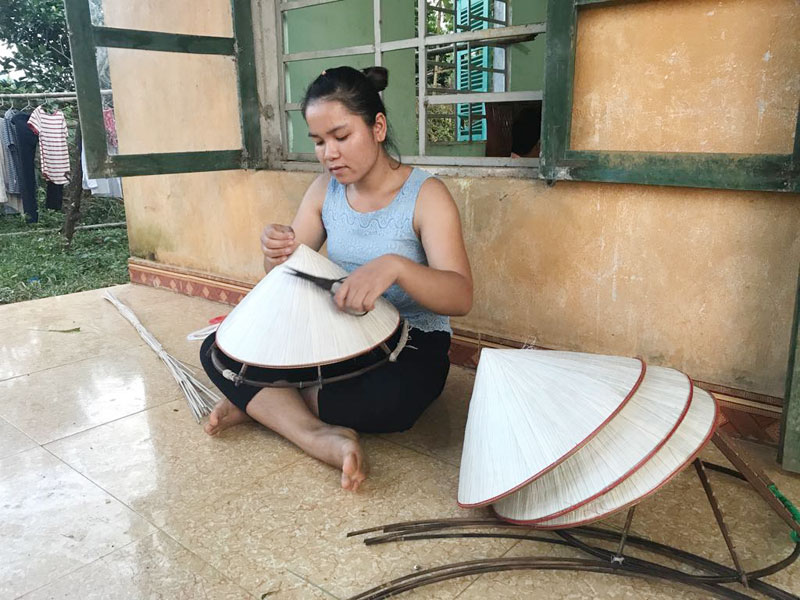
(HBO) - Over the past years, the authorities of Ngoc My commune (Tan Lac) have deployed many effective production models, creating jobs for laborers, helping to alleviate hunger, reduce poverty and raise their incomes. In particular, the conical hat making occupation have developed well and brought the significant revenue to many families.

Conical hat making job has brought the income of 2,5 – 3 million VND per
month to the family of Ms. Bui Thi Hoa, Bui village, Ngoc My commune (Tan Lac).
Currently, the whole commune has more than 400 families doing the job of
making conical hats. Although it is not the main job, the conical hat making is
the potential direction of economic development prospects. The conical hat
making job does not classify the laborers, people at any age can do it. On
average every month, the whole commune provides 10,000 - 12,000 conical hats to
the markets in the commune and surrounding areas. Each product costs from
30,000 to 40,000 VND, depending on its model and quality. After deducting the
expenses, each household can earn 2-3 million VND per month, which is a
remarkable income in rural areas. Ms. Bui Thi Hoa, a hat making woman at Bui
Village, said: "It is recognized that the conical hats are the favorite
products in the area, especially the model is made following the traditional
conical hats of Ha Tay, where I actively learned to make a hat. My average
income is from 2.5 to 3 million VND per month.
The leaves to make hats are imported from Chuong village, Phuong Trung
commune, Thanh Oai district (Hanoi). The materials are guaranteed right from
the selection part, so the hats are made of beautiful colors and durability.
"To make a quality hat, the material must be carefully selected. The
leaves cannot be too young or old, in light green color. The leaf layers are
close to each other, soft and 40-50 cm long. Thus, the products always meet the
qualifications and are favored by the customers." said Ms. Bui Thi Hoa, a
hats-maker in Bui village.
According to data from the Hoa Binh Provincial Party Committee, the industrial production index for the first six months of 2025 is estimated to have increased by 20% compared to the same period last year. This marks the highest year-on-year growth rate for this period since 2020.
In the first six months of 2025, Hoa Binh province’s export turnover was estimated at 1.145 billion USD, marking an 18.11% increase compared to the same period in 2024. Import turnover was estimated at $ 804 million, a 17.15% increase, which helped the province maintain a positive trade balance.
The lives of the ethnic minority farmers in Tan Lac district have gradually improved thanks to the new directions in agricultural production. This is a testament to the collective strength fostered through the professional associations and groups implemented by various levels of the district’s Farmers’ Union.
With the motto the "product quality comes first,” after nearly one year of establishment and operation, Muong village’s Clean Food Agricultural and Commercial Cooperative, located in Cau Hamlet, Hung Son Commune (Kim Boi district), has launched reputable, high-quality agricultural products to the market that are well-received by consumers. The products such as Muong village’s pork sausage, salt-cured chicken, and salt-cured pork hocks have gradually carved out a place in the market and they are on the path to obtaining the OCOP certification.
In the past, the phrase "bumper harvest, rock-bottom prices" was a familiar refrain for Vietnamese farmers engaged in fragmented, small-scale agriculture. But today, a new spirit is emerging across rural areas of Hoa Binh province - one of collaboration, organisation, and collective economic models that provide a stable foundation for production.
Maintaining growing area codes and packing facility codes in accordance with regulations is a mandatory requirement for agricultural products to be eligible for export. Recently, the Department of Agriculture and Environment of Hoa Binh province has intensified technical supervision of designated farming areas and packing facilities to safeguard the "green passport" that enables its products to access international markets.



